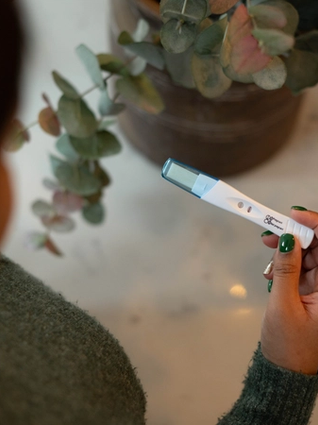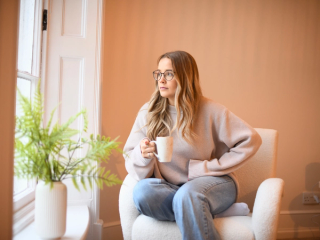
- Home
- Advice Hub
- Conception
- Signs Of Pregnancy
- What To Do When You Find Out You're Pregnant
What to do when you find out you're pregnant
Learn essential tips and expert advice on what to do when you find out you're pregnant, from health checks to nutrition, planning, and emotional well-being.
What is the first thing to do when you find out you’re pregnant?
When should you call the doctor after a positive pregnancy test?
What are the early signs of pregnancy in the first week?
What should you avoid after a positive pregnancy test?
When can you tell your friends and family about your pregnancy?
Taking a pregnancy test, seeing those two little lines and realising that you’re pregnant, is an exciting and happy time. However, you may also feel a little anxious and unsure about what to do. It’s normal to feel like this as, up until now, it’s all been about getting pregnant and now what do you do?
In this article we’ll be guiding you through the steps you need to take, so that you feel confident going in to the first weeks and months of your pregnancy. We’ll also be looking at the do’s and don’ts in early pregnancy so that you can make the right choices to have a healthy you and a healthy pregnancy.
What is the first thing to do when you find out you’re pregnant?
If you have missed a period, now is the time to do a pregnancy test. Pregnancy tests are most reliable from the first day of your missed period1.
If you’ve recently found out you’re pregnant, congratulations! This is exciting news and you and your partner, if you have one, may want to take some time to absorb this together.
Very soon your thoughts will be turning to what next, and one of the first things you’ll want to work out is your due date. You can use our due date calculator to help you find out.
If you haven’t already started taking folic acid and vitamin D, now is the time to start taking these important pregnancy supplements. 400 mcg of Folic acid daily increases your maternal folate levels to reduce the risk of neural tube defects, including spina bifida. 10mcg of Vitamin D daily, between the months of September and March, is recommended for all pregnant women to keep your bones, teeth and muscles healthy.
We know that not all pregnancies are expected or are happy news. You may feel shocked, confused or upset on finding out you’re pregnant. Your doctor will treat your pregnancy as confidential, even if you are under the age of 16. You will be able to discuss the options available to you, with your GP, and get the support you need.
When should you call the doctor after a positive pregnancy test?
As soon as you can, and before 8 -10 weeks of pregnancy, it is important to contact your GP surgery and tell them you have conceived. Your GP will then arrange for you to have a first appointment with a midwife (also called booking appointment). You will be offered tests which should be done before 10 weeks of pregnancy. Your midwife will ask you questions about your general health and give you all the antenatal care (the care you receive during your pregnancy) information you need to have a healthy pregnancy.
What are the early signs of pregnancy in the first week?
You are unlikely to notice any symptoms in the first few weeks of pregnancy as symptoms usually start around 4-6 weeks after conception. At this time, you may notice symptoms such as feeling more tired than usual, breast tenderness and feeling sick. During early pregnancy you might start to have strange tastes, smells or cravings and feel the need to pass urine more frequently. These are all common signs in early pregnancy, however as everyone is different, don’t worry if you don’t notice these symptoms.
What should you avoid after a positive pregnancy test?
It is recommended that you don’t drink alcohol during your pregnancy. There is no ‘safe’ level of alcohol to drink when you’re pregnant. Drinking during your pregnancy can cause your baby to develop Foetal Alcohol Syndrome2. If you are finding it hard to stop drinking, it’s important that you discuss this with your GP or midwife so that you can get the appropriate support.
If you smoke, then it is important to stop now that you are pregnant. Smoking can harm your unborn baby and your baby may have difficulties at birth or in early infanthood. If your partner, or someone you live with smokes this second-hand or passive smoking can also harm your baby.
To find out more about stopping smoking and to get the support you need you can contact the National Smokefree helpline on 0300 1231044 or speak with your GP. If you're in Ireland, head to the HSE website for more information on quitting smoking.
Some medication may not be safe to take during pregnancy and this includes certain over the counter medication. Check with your doctor or pharmacist that any medication you take is safe in pregnancy. Do not stop any prescribed medication without discussing this with your doctor first.
There are some foods, that now you are pregnant, are important to avoid. These include unpasteurised milk or cheese, cheeses such as brie, camembert, goats’ cheese and blue cheese such as Danish blue, gorgonzola and roquefort. There is a small risk that these foods may contain listeria bacteria which can harm your unborn baby. You can find out more about which foods to avoid by reading our expert guide.
Raw or undercooked meats can increase your risk of getting a condition called toxoplasmosis. Although this is rare, it can lead to miscarriage. Avoid eating raw or undercooked meat and pate. Game meats such as pheasant etc may contain lead shot and therefore should be avoided. Liver and liver products contain high amounts of Vitamin A which can be harmful to an unborn baby.
To reduce the risk of developing food poisoning during your pregnancy, it is important to avoid eating raw or partially cooked eggs. If you do eat eggs, make sure these are the British Lion eggs, and that you cook all eggs thoroughly.
You should avoid eating raw shellfish and other fish such as swordfish, marlin and shark as they may have harmful bacteria, virus or toxins in them. You should also limit your intake of oily fish to no more than 2 portions a week and eat no more than 4 medium size tins of tuna per week.
You can continue to drink caffeine if you wish, however have no more than 200mg per day or equivalent to 2 cups of instant coffee per day. Drinking more than this amount can increase your risk of pregnancy complications such as low birth rate, miscarriage and stillbirth3.
When can you tell your friends and family about your pregnancy?
There is no right or wrong time to share your pregnancy news. This is a personal decision and is based on what feels right for you (and your partner, if you have one). Some people decide to wait until after 12 weeks of pregnancy, as by this time the risk of pregnancy loss has reduced. Others decide to tell friends and family earlier, especially if they feel they need support from those around them.
In this article we have discussed what to do when you first find out you’re pregnant, when you might start to notice pregnancy symptoms and the importance of contacting your GP to arrange to see a midwife for your booking appointment. Your midwife will go through what to expect in the coming weeks and months and answer your questions.
Don’t forget to start taking daily folic acid and vitamin D now and be aware of the foods to avoid during pregnancy. We have also explained why it is important to stop drinking alcohol and to cease smoking if you smoke or vape.
Wishing you a very happy and healthy pregnancy!
Note: If you are worried about being pregnant or about your baby, don’t hesitate to contact your doctor or midwife to talk about your concerns and get the support you need.

